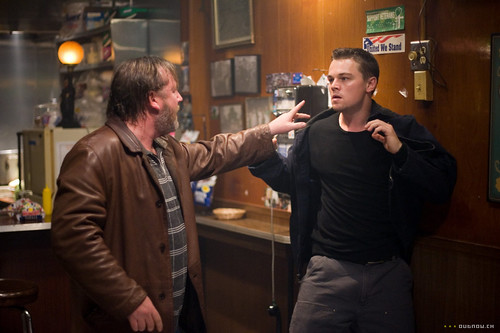Ray Winstone & Leonardo Di Caprio
Try and look at The Departed, Martin Scorsese’s masterful crime drama that’s up for the Best Picture Oscar this year – and which just might really be the best picture nominated – from the perspective of Wai Keung Lau and Siu Fai Mak, the directors of Infernal Affairs, the Hong Kong-based thriller on which Scorsese’s
What surprised me most when I finally got to see The Departed this past week was its tautness – compared with Infernal Affairs, it’s a master class on how pacing, editing & the presence of the right score (Scorsese’s with its almost gentle Rolling Stones undertones is by Lord of the Rings veteran Howard Shore) are what make a film tight, not length. The film also showcases the best acting Jack Nicholson has done in at least a decade & the best Leonardo Di Caprio has done since, say, What’s Eating Gilbert Grape? (for which Di Caprio rightfully was nominated for an Oscar). Di Caprio comes across as a completely different human being in this film, something Matt Damon couldn’t do if his life depended on it (Damon’s a decent enough thespian, tho with limited range), and something Nicholson hasn’t tried since Five Easy Pieces. The one Oscar nod for acting to come out of this film, for Mark Wahlberg’s good cop with a bad mouth, is bizarre given the degree to which Di Caprio & Nicholson offer master classes here. Marky Mark hardly has more to do in this film than his brother Robert, who plays an FBI agent. Also excellent in smaller roles are Vera Farmiga, as the police psychologist who always falls for the wrong guys, and British actor Ray Winstone, as one of Nicholson’s goons, Mr. French.
The plot of the two movies is identical. Street kid gets noticed by local mob boss & sent to the police academy in order to give the boss a pair of ears on the inside; second police cadet gets picked for a deep undercover assignment & accordingly gets drummed out of the academy, given a rap sheet, and told to fend for himself as he infiltrates the mob boss’ organization. At which point both the undercover cop and the “rat” inside the police department spend much time trying to figure out just who the other one is, while also not getting caught themselves. The architecture of the plot, originally written by Siu with Felix Chong, is marvelously crafted & dazzlingly complex. It’s certainly conceivable that I found Scorsese’s telling “cleaner” because I’d already seen Infernal Affairs, but I don’t really think so. One of the layers of difficulty that Scorsese has added is the physical similarities of Di Caprio and Damon, which could (and I think this is intentional on the director’s part) confuse even fans of the two, especially during the first half hour of the film. That’s not in the
Scorsese has been one of
Indeed, there are very few scenes in Internal Affairs that are notably better than The Departed. The first (and perhaps most important) is the scene on the roof where the two protagonists finally confront one another – it’s a scene that, in Infernal Affairs, owes more to movies like Die Hard and Dirty Harry than it does to Scorsese, and Scorsese downplays the vista right where Infernal Affairs made it a major part of the scene. A second, perhaps for the same reasons, is the fall of the police official who has been running the undercover operation inside the gang. There is also an important difference in the set up to the funeral scene, as to just who decided to recommend the deceased for honors. Scorsese’s solution underscores the sliminess of a key character, where Infernal Affairs accentuated the role of the romance. I actually prefer Scorsese’s approach here, tho I think you could make an argument for either one.
The Departed is a more complex, more compelling film than either






